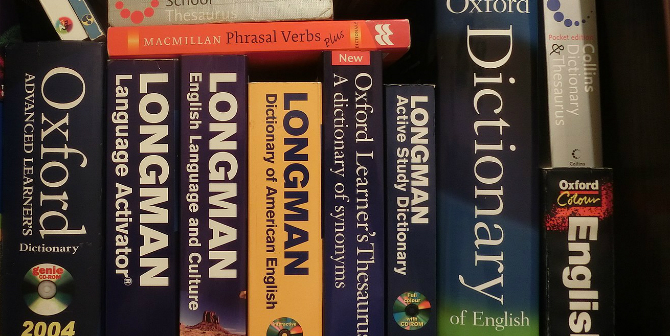 English is one of the EU’s 24 official languages and the main working language in the EU’s institutions. This is unlikely to change because of Brexit. In fact, English may come to be seen as a more neutral language because it is no longer associated with one specific member state, writes Nils Ringe (University of Wisconsin – Madison). It is likely, however, that the particular “EU-English” that is already used inside the institutions will become more distinct with fewer native English speakers around.
English is one of the EU’s 24 official languages and the main working language in the EU’s institutions. This is unlikely to change because of Brexit. In fact, English may come to be seen as a more neutral language because it is no longer associated with one specific member state, writes Nils Ringe (University of Wisconsin – Madison). It is likely, however, that the particular “EU-English” that is already used inside the institutions will become more distinct with fewer native English speakers around.
Within days after the Brexit referendum of June 23, 2016, Danuta Hübner, a senior MEP and chair of the EP’s Committee on Constitutional Affairs who previously served as Commissioner for Regional Policy, suggested that English may be dropped as an official EU language. I was in Brussels at the time conducting interviews with EU policymakers in various EU institutions for my book project on “The Language(s) of Politics: Multilingual Policy-Making in the Institutions of the European Union,” which allowed me to ask my respondents if English might be leaving the EU along with the UK. The response was a resounding “no.” The overwhelming consensus among my numerous respondents was that Brexit would have little impact on the dominance of English in EU politics, and that English would surely not disappear as an official language and as the main working language of the EU. One member of the EP called the stories about the EU ditching English “absolutely ridiculous!”
The main reason why English is unlikely to lose its status as an official language of the EU is that it would require a unanimous vote of the member states to change the Union’s language rules, which date back to 1958 and today recognize 24 official languages. The two member states in which English is an official language, Ireland and Malta, would almost certainly reject the idea, however. English has also, especially following the 2004 eastward enlargement, replaced French as the main language spoken and written inside the EU institutions (with the exception of the Court, which continues to operate primarily in French) and is “the most common bridge” for direct communication, as another MEP put it. There is no obvious alternative to English as the main working language, since not enough EU actors speak and share even the other “big” languages, like French or German. Some people (or member states) may be hoping for the rise of their respective languages, but there is little doubt that English is here to stay.
 Image by Alborzagros, Creative Commons Attribution-Share Alike 4.0 International.
Image by Alborzagros, Creative Commons Attribution-Share Alike 4.0 International.
It is conceivable, however, that English might be “losing importance in Europe,” as Commission President Jean-Claude Juncker suggested in May 2017 and as several of the officials I interviewed also indicated. “What the status of English will be, we don’t know yet,” one of them emphasized; he and several others suspected that “more things will be done in more languages,” in the words of a Council representative.
An alternative and a somewhat counter-intuitive scenario is that, in the long run, English might be strengthened as the EU’s main working language because of Brexit. Despite its widespread use inside the institutions, EU actors tend to associate the language with one particular member state – one that happens to be large, powerful, and often recalcitrant. Paradoxically, Brexit may therefore lead to English being perceived as a more “neutral” language. “Funnily enough,” one former EP official suggested,” it might very well entrench its use, on the grounds that you’ll no longer have the one dominant nationality going around using their English, and even the French might feel more relaxed about using English.” In contrast, the increased use of a language that remains tied to a particular member state, like French or German, would be seen with apprehension. A high-ranking official in the Permanent Representation of a member state explained that “any other EU language will have this national aspect, [so] that you are giving more weight to some specific country. For example, if you say that we will use French more, Germans will not be happy about this, and if you say we use German and French, the Spaniards and Italians and Poles will not be happy about it.”
One possible, or perhaps even likely, implication of this “de-nationalization” of English in the EU is that non-native speakers will increasingly shape a specific variant of English that fits the particular communication needs of the participants in EU policymaking. A kind of “EU-English” is already used inside the institutions, with a shared, limited, and specialized vocabulary, a simplified sentence structure, and broadly accepted deviations from “proper” English. A native English speaker in the Council thus speculated that, with a much smaller number of native English speakers left inside the institutions after Brexit, “English becomes more and more Euro-English.”
Brexit will have many dramatic implications but will be of little consequence to EU multilingualism in the short term. Over time, however, it might well give (EU-)English an unexpected boost.
This post represents the views of the author and not those of the Brexit blog, nor the LSE.
Nils Ringe is Professor of Political Science, Jean Monnet Chair, and Director of the Center for European Studies at the University of Wisconsin – Madison.







Thank you for an enlightening and informative , not to mention , well-written article .
It seems very likely to me that English will remain the main language of the EU after Brexit, and also that it will be associated less with the country that gave us that language. Besides, English will continue to help us hold our troubled European family together.
When I participated in EuroControl projects, I often had to correct documents from Euro English to native English. It will be interesting to see how things will progress in future. Will Irish and Maltese participants become overworked?
@Teejay, I work in a business environment where English is heavily used but where I am one of only a few native English speakers. I do not have time to correct the numerous grammatical mistakes my colleagues make, and I don’t expect the Irish and Maltese will have either. Most of the world think English is easy to learn. It is, if you just want to make yourself understood, but not if you want to imitate native English speakers perfectly.
In the long term, I expect Englsih will develop in the same way Latin did in the Middle Ages, used by almost everyone for international communication, but without anyone bothering much about getting the adjective endings, tenses or word order “right”. Even in the home country, I fear the days of such things as adverbs or “whom” are numbered.